Call to raise 'life-saving' minimum alcohol price in Scotland
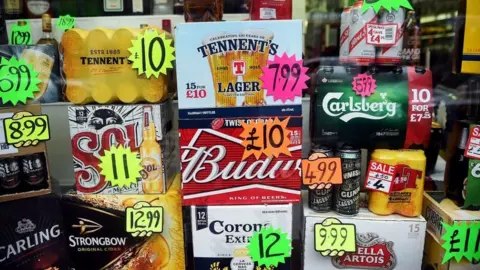 Getty Images
Getty ImagesScotland should increase its minimum unit price for alcohol from 50p to 65p, campaigners have said.
It came as a final evaluation of the policy claimed that it averted alcohol-related deaths and hospital admissions, and lowered alcohol consumption.
However, Public Health Scotland also said it had a limited impact on the most harmful drinkers.
Health experts said ministers should consider increasing the unit price to build on the "life-saving policy".
The Scottish government said it would consider the report's findings.
What effect has MUP had on public health?
In May 2018, Scotland became the first country in the world to set a minimum price of alcohol, with an initial price of 50p a unit.
Since then academics have been evaluating the impact minimum unit pricing (MUP) has had on Scotland. A new Public Health Scotland report collates 40 studies to examine the policy's effect on health, business and public attitudes.
Overall, the report claims MUP "had a positive impact on health outcomes, including addressing alcohol-related health inequalities".
Based on comparisons with England, analysis by Public Health Scotland estimates that there were 13.4% fewer deaths related to alcohol than would have happened without the policy, as well as 4.1% fewer hospital admissions.
There were 1,245 alcohol-specific deaths in Scotland in 2021, an increase of 5% on the previous year. This was the highest number registered in a year since 2008.
The report also said the largest reductions were seen in men and those living in the 40% most deprived areas.
Clare Beeston, who led the evaluation of MUP, said: "Those living in the most socio-economically deprived areas in Scotland experience alcohol-specific death rates at least five times greater than those living in the least deprived areas. Alcohol-related disorders are a leading contributor to health inequalities in Scotland.
"Overall, the evidence shows that MUP has had a positive impact on improving health outcomes, including alcohol-related health inequalities, and can play a part in addressing the preventable harms that affect far too many people, families and communities."
'Benefits will be amplified' with price increase
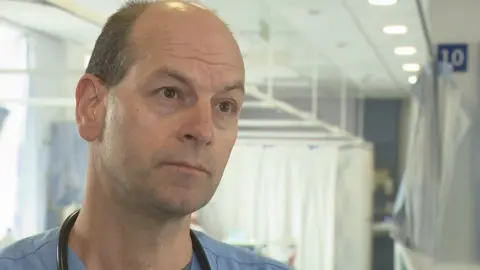
Professor Ewan Forrest, a consultant liver specialist at Glasgow Royal Infirmary, said he has seen a "significant" impact on hospital admissions for alcohol-related liver disease as a result of MUP.
However, he also said the price must rise.
The surgeon - who is also on the steering group with Scottish Health Action on Alcohol Problems (SHAAP) - said: "The 50p minimum unit price was established nearly a decade ago.
"Obviously a lot of things have changed in that time, including inflation. It seems only sensible that the minimum unit price would increase in parallel with that.
"I would certainly be advocating for it going up to 65p or more. Its benefits will be amplified at that higher level."
His comments were echoed by the charity Alcohol Focus Scotland, the Royal College of Physicians of Edinburgh and BMA Scotland.
'Retailers are winning but consumers are losing'
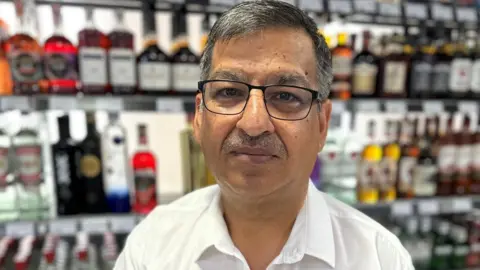
Initial opposition to MUP came from the drinks industry and retailers while a legal bid by the Scotch Whisky Association to halt the policy failed in 2017.
While there was a 3% reduction in alcohol consumption as measured by retail sales, Public Health Scotland claimed there was "no clear evidence of substantial negative impacts on the alcoholic drinks industry in Scotland as a whole".
Shopkeeper Abdul Majid, a past-president of the Scottish Grocers' Federation, expressed concern about the policy before it was introduced.
However, he said the policy has meant smaller retailers can now compete with supermarkets on alcohol sales.
He said: "We're winning in the sense that it's giving us more profits, in that we don't have to do the deep promotions anymore.
"In the sense that the retailers are winning, you could argue that the consumers are losing out on the deep value they had in the past."
'It became harder for him to feed his addiction'
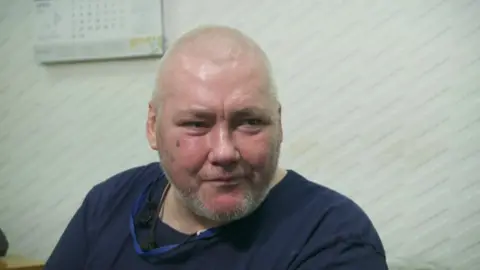
Public Health Scotland stated that there was "limited evidence of any reduction in consumption" in those who were dependent on alcohol.
The report added that there was evidence of "negative health and social consequences at an individual level, particularly for those with alcohol dependence who are financially vulnerable".
In 2019, BBC Scotland's The Nine programme interviewed Danny Girvan to discuss the impact of MUP one year after its implementation.
The 45-year-old said he had become dependent on alcohol and complained of rising prices.
He said a reduction in his alcohol intake had led to "shakes, sweating and vomiting".
He continued: "I'd go into the shop and buy about 10 cans and it would only be a fiver. It was about 90 pence for those cans I'm drinking and now they are £2."
Mr Girvan died several months after the programme aired.
Last week, his niece Natasha told the BBC: "Through the years, people would try and help him, or encourage him with new hobbies like pigeons and boxing.
"It did get progressively worse through the years and the addictions got worse as well.
"With the price increase, I think it became harder for him to feed his addictions and habits.
"Then ultimately, the withdrawals would've got worse and his health would've got worse."
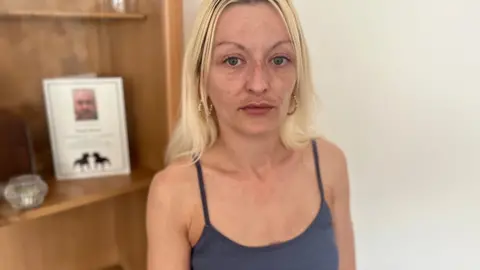
What happens next?
The 2012 law that established MUP has a "sunset clause" that means MSPs must vote on whether the policy should continue before 1 May 2024.
Elena Whitham MSP, minister for drug and alcohol policy, hailed the policy as having a "positive impact in cutting alcohol consumption" and that the Scottish government would now conduct its own review of the findings.
She told BBC Scotland: "We will bring that forward to the parliament later in the year.
"Any increase to the level that minimum unit pricing is set at will need to be underpinned by robust evidence. It's only right that I take time to actually digest this and we look at all of the evidence in the round."
She added: "That will result in a robust evidence paper coming before parliament, where, if the government decides that the evidence is there to support the continuation of MUP, we will lay orders later in the year."
Scottish Conservative health spokesman Dr Sandesh Gulhan, said MUP was a "blunt instrument to tackle a complex problem".
"Alcohol deaths are at their highest level since 2008 in Scotland on the SNP's watch," he said.
"As the report highlights, minimum unit pricing alone will not fix the issues facing those struggling with addiction.
"If SNP ministers are remaining committed to minimum unit pricing, they must also give their full commitment to the Scottish Conservatives' Right to Recovery Bill.
"It is backed by frontline experts and would guarantee treatment to all those who need it."
